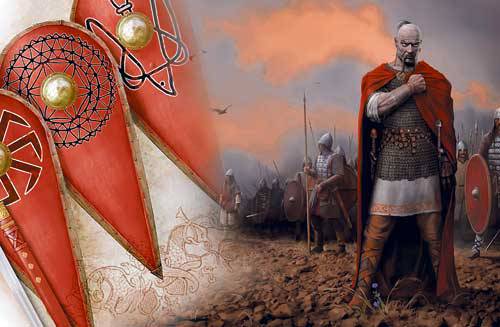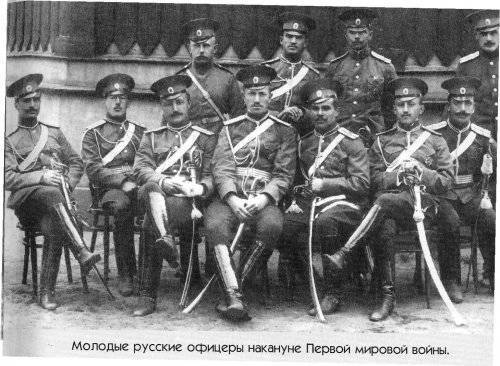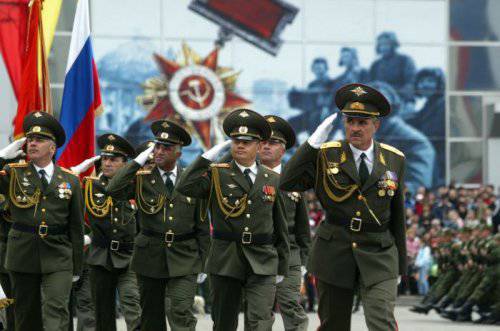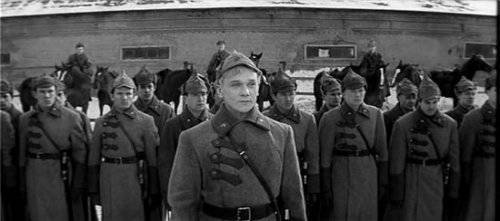Honor to no one!

Recently, the brochure entitled “Soviets of a Russian officer,” issued by the editors of the journal of the Internal Troops of the Ministry of the Interior of Russia, “Columnar of the Russian Imperial Army, V. M. Kulchitsky,” came into my hands. Many of our older commanders, these recommendations are well known from the time of the cadet. Typed by handwritten, they left very few people indifferent. A common thread through all the instructions of Kulchitsky is the issue of officer's honor, which has always been relevant to the domestic Armed Forces - in pre-revolutionary, royal times, and under Soviet rule. But today, it seems to be even more significant.
What is honor, where did this concept of our ancestors come from and why is it considered the core quality of an officer?
SAINT OF THE HOUSEHOLD
Already in the epoch of Ancient Russia, an estate of warriors-professionals was formed - princely and boyar warriors, for whom it was a rule, along with military skill, to be proud of observing the rules of military honor. Kiev Prince Svyatoslav Igorevich (IX century), gathering in battle with the superior forces of the enemy, addressed his army with the words: “We will not disgrace the Russian land, but let us lie down with our bones. Dead Bo shame not imut. We do not have the habit of fleeing. Let's be strong. ” Inspired by these words, warriors survived under the onslaught of the enemy and returned to their homelands undefeated.
So, obviously, for the first time in the national stories It was clearly formulated and documented in Russian chronicles one of the most important axioms for a person who chose the war path. You will not observe it - and then what is your military honor. Notice that Svyatoslav is talking about shame. This is not by chance. Our ancestors most of all sought not to compromise with conscience, the loss of which gave rise to shame, after which life itself lost its meaning. For honor and conscience do not exist separately and have always been put on the highest place in the list of virtues that are obligatory for a Russian soldier.
Our famous commanders of the 18th-19th centuries, military leaders, scientists, writers and writers of that time wrote a lot about the officer and military honor. Here is how surprisingly heartfelt said about her, for example, Colonel of the General Staff M. S. Galkin: “Honor is an officer’s shrine ... it is the highest good ... honor is a reward in happiness and consolation in grief. Honor tempers courage and ennobles courage. Honor knows neither dangers nor dangers ... honor does not tolerate and does not endure any blemish. ”
Peter the Great, the creator of the Russian regular army, demanded that officers “honor”, knowing full well that without it, there is no officer as such.
The honor of a person in uniform, as a litmus test, should first of all manifest in battle, when performing a combat mission. According to A. V. Suvorov, who, in my opinion, was the standard of the officer, it was the sense of honor that prompted the soldiers to martial affairs. In combat, honor is primarily expressed through personal courage, courage, resilience, self-control, readiness for self-sacrifice. In the name of the success of the battle, Russian officers, captivating the soldiers by their example, overcame seemingly insurmountable obstacles (let us recall the terrific example of the Suvorov miracle heroes crossing the Alps). And the more difficult the situation was, the harder was the desire of the officer to execute the order at any cost — after all, the honor was at stake! Personal honor, regiment honor, honor of the whole army.
To the Austrian general Melas Suvorov, who panicked in difficult climatic conditions, sent a letter filled with barely disguised contempt: “Women, beauties and sloths chase after good weather. A big talker who complains of service will be, as an egoist, removed from office ... Italy should be freed from the yoke of atheists and French: every honest officer should sacrifice himself for this purpose ... "Notice, according to Suvorov, an honest officer - this is the carrier of officer honor.
The military must be honest, keep his untainted reputation, no matter where he is: on the battlefield, in the company of his colleagues, in everyday life, where none of his comrades can see him, and even ... once in captivity. Here you can recall the feat of Lieutenant General D. M. Karbyshev, being contused, in an unconscious state was captured by the Germans. Nothing could shake a courageous military leader, force him to compromise with his conscience, break the oath to agree to serve the enemy! He was brutally tortured, but did not become a traitor, retained the officer's honor.
NO RIGHT TO DEAL WITH CONSCIENCE
Although in peacetime, a military servant does not have to choose - honor or betrayal of the Motherland and violation of the oath. However, even in modern conditions, courage is required to preserve one’s honor. Because “honor honor” should manifest itself first of all in strict compliance with the person in the shoulder straps of official duties, orders and instructions of the authorities. And it is not easy!
But not without reason there is such a definition: the fulfillment of the task set is a matter of honor! This requirement is caused by the special status of an officer who has no right to refuse, to evade the assigned task, because he is a sovereign person who does not belong to himself. It is difficult to agree with such a statement: how is it not to belong to yourself ?! However, this also has a special manifestation of honor, a kind of privilege - if not us, then who? And remember the famous motto of the Russian officers: “Soul to God, life to the Fatherland, honor to no one!” Not everybody has such strict requirements, which is why an officer is not just a profession, like a doctor or teacher. The officer is the backbone of the army, the shield of the Fatherland, and the shield must be flawless.
He was reminded of this by the form that he had no right to take off, his shoulder straps, as well as his personal weapon (all together to a great extent), the glorious history of the regiment, its traditions, the banner and the colleagues themselves are combat comrades. And corporativeness, estate (the first officer's rank right up to the hereditary nobility until the middle of the XIX century), self-awareness of “nobleness” (belonging to the good - good kind of defenders of the Fatherland), the existing system of training and education contributed to the formation of pride. Unfortunately, many of these principles were destroyed and lost over time, and the current officers, at first glance, can hardly be compared with the brilliant guardsmen of the past. However, the continuity of generations, a single goal and the presence of officer honor, of course, unite and make them related, put them in one row.
It is from the officers that society awaits the feat, the readiness for self-sacrifice. Why? There is only one answer - they have no right to refuse, turn aside, hide behind someone's back, because they have the honor! It does not matter that the serviceman has a low salary, there is no apartment, a bunch of other unsolved problems, which, of course, is in itself disgusting. The paradox is that the state is to blame (but not the Motherland, not the Fatherland), the officials whom he protects, maybe even his senior bosses. But even this does not give the right to a real person in uniform to make deals with his conscience, to lash out, to stain his honor with unworthy deeds.
Alas, in recent times a cutting rumor has appeared - “officer crime”. According to the Chief Military Prosecutor’s Office, now every third crime in the army, most of which have a mercenary orientation, is committed by officers. This terrible scourge, which hit our Armed Forces and Internal Troops, is undoubtedly connected with the loss of honor by the servicemen. After all, committing a similar crime, the officer at the same time loses his honor, dishonors his name. Why does he not think about it, does not value his good name?
Most likely, such a person initially had no sense of possessing honor and did not feel any internal discomfort about it. After all, the honor is not awarded automatically along with lieutenant shoulder straps. Such a feeling is developed only as a result of various situations that he experienced adequately during his service or in battle. And if the officer did not peremog them, did not pass such an important exam, then the hypothetical loss of untainted reputation doesn’t worry him much. For him, honor is what is more correctly called a military salute. I gave it away and went on about my business.
"... NOT FATTY OKLADA, AND IDEA SERVICE"
It is the presence in the ranks of a certain number of servicemen with an atrophied and unclaimed notion of a sense of honor that explains the bleak picture of the growth of officer crime. Therefore, to stop this process, in addition to measures taken by the military prosecutor's office and command, can only be a return, and in most cases strengthening of this feeling in people in uniform.
Why in the old days about such shameful phenomena was hardly heard? Do you think because the officers lived better? Perhaps, in part, this is true, but was it really only served because of the benefits and self-interest? Fortunately, domestic history, in which people of military labor played a huge role, refutes this argument. Almost all seafarers and explorers, polar explorers and cosmonauts, many writers, poets, artists, and composers were officers. I'm not talking about statesmen. The prestige of the officer profession was above all held on the right to have a special status, rights and honor. Honor is the privilege of only an officer, which is enshrined in the current statutes. And these officers cherished this exclusive right. What does this require?
Honor not without reason called the shrine of the officer. The concept of a shrine for a person brought up in traditional faith, family and school was something that cannot be broken, crossed, because it was a sin and entailed an inevitable punishment - the death of the soul. “The beginning of wisdom is the fear of the Lord!” Is written in the Bible. The loss of the fear of God, the elimination of the idea of sin and the free interpretation of shame, the denial of the soul as an independent immortal substance naturally facilitated compromises with conscience, and therefore with honor. “If there is no God, then everything is permitted,” noted FM Dostoevsky, also a reserve officer, by the way.
A person with a similar outlook is difficult to understand what holiness is. If there is no God, then there is no holiness. And if nothing is holy, then honor is just an ephemeral concept. Everyone is his own god, his own judge and lawgiver. Therefore, over time, the concept of holiness lost its meaning and later completely depreciated, was remembered in vain. This is the reason that most of the officers who are told about holiness, duty and honor remain immune to appeals. By and large, they do not understand what they are talking about; they see emptiness behind this concept.
And it is difficult for such officers to explain that the desire to possess, for example, a more prestigious brand of a cell phone or car is called passion. That the willingness to satisfy this passion to break the law for an officer is not only a crime, but also a shame, disgrace. Any justification for such actions can be taken from a civilian, because he did not take the oath, does not wear shoulder straps, is not obliged to observe honor. For an officer, they become unacceptable. Why? Yes, all for the same reason - he has the honor, and this obliges him to be honest always and in everything!
According to the well-known pre-revolutionary military theorist Colonel V. Raikovsky, there is only one motivation for serving as an officer: “Not fat salaries and personal well-being of a material nature ... but ideological service to the cause”. And it is impossible without the highest concept of honor. Hence the tradition of selfless service. To whom? Not Ivan Ivanovich, not his commander, but the Fatherland! What could be higher on earth? It was from the realization of this height that Suvorov’s heart was overwhelmed with feelings when he wrote in his “Science to conquer”: “Gentlemen, what a delight!”. The officer from his involvement in the holy and responsible business - the defense of the Motherland was filled with a sense of pride. Yes, he is the person who is ready to fulfill his duty to the end - to give his life for the Motherland. For this he respects himself and has the honor!
The concept of honor, inseparable from honesty and conscience, must be brought up from childhood, cultivated as a patient gardener grows a fruit tree, then it will grow and bear fruit. The process of educating an officer - a man of honor, of course, must be adjusted and put on stream. Where? Of course, in military institutions. But as early as the beginning of the twentieth century, on the eve of the revolutionary events that shook the country, Colonel of the General Staff M. S. Galkin complained about this: “In military schools, the preparation of the moral side of an officer’s duties takes very little space. All attention is paid to the craft, to the technical side, to science ... ”Learning from the mistakes of the past, today it is necessary to create all conditions for this.
A huge educational role is played by the personality of the course officer, the teacher, and directly in the troops - a mentor, the chief. If his words do not disagree with business, he is restrained in analyzing the errors of his subordinates, always smart, correct and cheerful in spirit - all of this, together with the personality of the carrier of these qualities, creates an excellent role model.
And when the boss himself is not the master of his word, he is arrogant, in a conversation with his subordinates he constantly breaks down to screaming, does not restrain himself in strong expressions even in the presence of women, publicly humiliates the human dignity of his subordinates, uses his fists - what kind of officer honor can he use ? Only negative.
The issue of educating an officer as a man of honor is a key issue for the Armed Forces. The army, ruled by dishonest officers, is doomed to lose confidence in the people and authority in society and, as a result, to lose in any coming war. No need to wait for instructions from above and the relevant orders. Salvation of drowning people, as is known, is the work of the drowning people themselves. The salvation of the prestige of the army, the troops - the work of the military.
The army, the state as a whole has no future, if its officers do not have a sense of honor. Comrades officers, think about it! I have the honor!



Information